|
|
|
Sort Order |
|
|
|
Items / Page
|
|
|
|
|
|
|
| Srl | Item |
| 1 |
ID:
127002
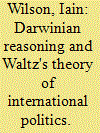

|
|
|
|
|
| Publication |
2013.
|
| Summary/Abstract |
There are important parallels between the pattern of inference Kenneth Waltz uses in his Theory of International Politics and early Darwinian reasoning. This early Darwinian thinking has needed to be significantly refined by modern evolutionary biologists, and their amendments are equally relevant to Waltz's model. Waltz allows for states to imitate each other and also accepts that they are only rarely eliminated from the system. Modern Darwinian analyses show that where elimination is rare and imitation is common, it is quite possible for deleterious behaviours to become widespread. We cannot assume an anarchic system will select for security-enhancing behaviours in major powers. Thinking about Waltz's argument in these terms opens space to disagree with his conclusions while respecting the strength of his logic.
|
|
|
|
|
|
|
|
|
|
|
|
|
|
|
|
| 2 |
ID:
147685
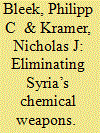

|
|
|
|
|
| Summary/Abstract |
The 2013–14 disarmament of Syria's chemical-weapons capabilities was a rare bright spot in a brutal civil war with no end in sight. The remarkable US-led, international effort to bring Damascus into the 1997 Chemical Weapons Convention, inventory its capabilities, and then verifiably destroy them is a fascinating and, to date, largely untold story. A substantial US government interagency effort centered in the Defense Department laid the diplomatic, technical, and procedural foundations for Syria's disarmament in the year prior to the August 2013 chemical-weapons attack in Ghouta that galvanized Syria's subsequent disarmament. An intrinsically interesting case, Syria's chemical-weapons disarmament has important implications for possible future WMD elimination operations elsewhere.
|
|
|
|
|
|
|
|
|
|
|
|
|
|
|
|
| 3 |
ID:
147673


|
|
|
|
|
| Summary/Abstract |
This special issue of the Nonproliferation Review results from a project funded by the US Defense Threat Reduction Agency, aiming to identify lessons learned from efforts to eliminate weapons of mass destruction (WMD) around the world. It contains edited versions of papers presented at a November 2015 workshop at the Washington, DC, offices of the James Martin Center for Nonproliferation Studies. One section covers cross-cutting themes, including the strategic, diplomatic, legal, technical, and inter- and intra-agency dimensions of elimination. The second section discusses lessons learned from work in the former Soviet states, Iraq in the 1990s, Iraq in 2003–04, South Africa, Libya, and Syria. Major observations include that the field lacks institutionalization. There are few standing bodies with funding and responsibility for WMD elimination; each case usually emerges by surprise and has ad hoc character. Different combinations of states and international agencies may be involved, bringing varied authorities and competencies to different operational environments. A generic “checklist” approach accordingly may be best suited to applying past lessons to new missions.
|
|
|
|
|
|
|
|
|
|
|
|
|
|
|
|
| 4 |
ID:
095728
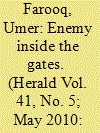

|
|
|
| 5 |
ID:
147682


|
|
|
|
|
| Summary/Abstract |
South Africa had active nuclear, biological, and chemical weapons programs during the 1970s and 1980s. South Africa dismantled its nuclear weapon program prior to its 1991 accession to the Treaty on the Non-Proliferation of Nuclear Weapons (NPT). Similarly, it terminated its chemical weapons program prior to its 1995 ratification of the Chemical Weapons Convention. Only the dismantlement of Pretoria's nuclear weapons program was subjected to international verification—albeit ex post facto—following a 1993 decision of the International Atomic Energy Agency (IAEA) General Conference to verify the correctness and completeness of South Africa's declarations under its NPT safeguards agreement. During the 1980s, South Africa also developed and purportedly used biological weapons, violating its obligations under the 1972 Convention on the Prohibition of the Development, Production, and Stockpiling of Bacteriological (Biological) and Toxin Weapons and on their Destruction, which it had ratified in 1975. This article draws lessons from the verification of the dismantlement of these programs and makes recommendations for future verification work to confirm the elimination of weapons of mass destruction capabilities.
|
|
|
|
|
|
|
|
|
|
|
|
|
|
|
|
| 6 |
ID:
132977
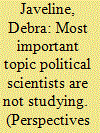

|
|
|
|
|
| Publication |
2014.
|
| Summary/Abstract |
Surprise is an intrinsic fact of political life and its elimination, especially with regard to extraordinary moments of protest and revolution, is a vain endeavor. Prediction and explanation are fundamentally different enterprises. While scholars may be well-positioned to trace, retrospectively, the motivation, networks, leadership, and other contextual factors that fueled the events of 2011 and 1989, such analysis will never bestow the sort of predictive power that will eliminate the surprise of mass uprisings. Verstehen-esque studies of mobilization, while crucially enlightening, have limited capacity to augment our powers of foresight due to the fundamental gulf between agency and intention as well as the causal disconnect between precedent and prediction.
|
|
|
|
|
|
|
|
|
|
|
|
|
|
|
|
| 7 |
ID:
147678
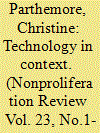

|
|
|
|
|
| Summary/Abstract |
Technology plays a central role in efforts to eliminate weapons of mass destruction (WMD). Past efforts to destroy WMD and related materials have commonly featured novel combinations of technologies designed to meet unique circumstances. In order to present the technical aspects of elimination in a context that can inform future elimination missions, this article begins by noting technology's important role. It then highlights challenges that will shape technical decisions for future missions, focusing on uncertainties, the evolution of WMD threats, the need to balance technical investments, and fighting complacency. It then offers lessons from past WMD elimination missions, including the importance of remaining innovative and agile, using a range of scenarios for planning technical options, consulting early with the full range of stakeholders who could support or challenge technical decisions, developing strong communications plans, and ensuring that plans account for critical enabling technologies. Finally, it recommends that the United States maintain elimination “on-ramps” for a range of potential future elimination missions, create a standing body to help maintain technical elimination capacity, and internationalize planning and implementation.
|
|
|
|
|
|
|
|
|
|
|
|
|
|
|
|
| 8 |
ID:
147683
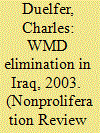

|
|
|
|
|
| Summary/Abstract |
The full picture of Iraq's weapons of mass destruction (WMD) programs became clear after 2003. The Iraq Survey Group (ISG) had extraordinary access to people, documents, and sites. The findings revealed much about Iraq's decision making regarding WMD as well as the success of UN inspection activities. Pre-war errors in process and judgments concerning Iraq's WMD must be considered in the context of the times. This is especially true regarding pre-war intelligence assessments that were based on bad analysis, insufficiently caveated, and grossly wrong.
|
|
|
|
|
|
|
|
|
|
|
|
|
|
|
|
|
|
|
|
|